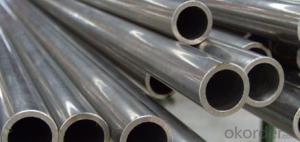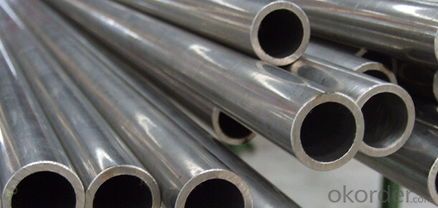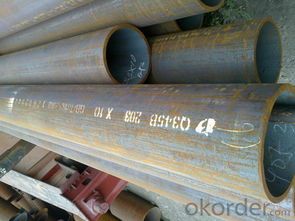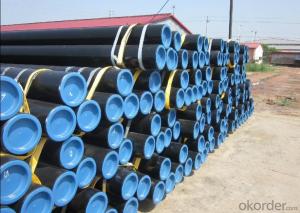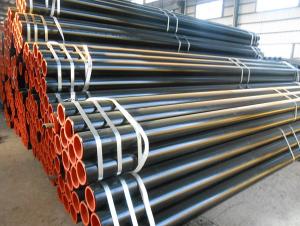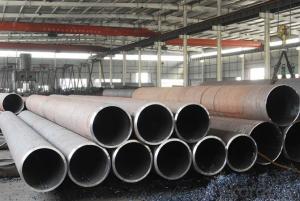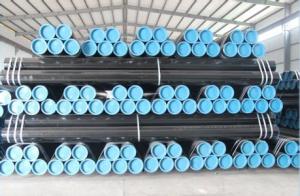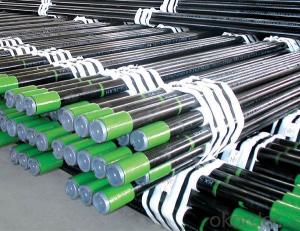API 5L/ 5CT Seamless Carbon Steel Line Pipe
- Loading Port:
- Tianjin
- Payment Terms:
- TT OR LC
- Min Order Qty:
- 25 m.t.
- Supply Capability:
- 10000 m.t./month
OKorder Service Pledge
OKorder Financial Service
You Might Also Like
Product Description:
1、Structure of API 5L/ 5CT Seamless Carbon Steel Line Pipe Description:
Seamless steel pipe is formed by drawing a solid billet over a piercing rod to create the hollow shell. As the manufacturing process does not include any welding, seamless pipes are perceived to be stronger and more reliable. Historically seamless pipe was regarded as withstanding pressure better than other types, and was often more easily available than welded pipe.
2、Main Features of API 5L/ 5CT Seamless Carbon Steel Line Pipe:
• High manufacturing accuracy
• High strength
• Small inertia resistance
• Strong heat dissipation ability
• Good visual effect
• Reasonable price
3、 API 5L/ 5CT Seamless Carbon Steel Line PipeImages:
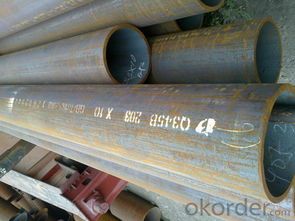
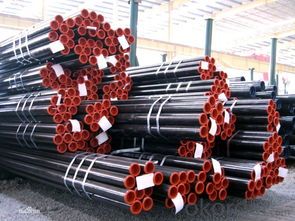
Packaging & Delivery
Packaging Details: | seaworthy package,bundles wrapped with strong steel strip |
Delivery Detail: | 15-30days after received 30%TT |
4、 API 5L/ 5CT Seamless Carbon Steel Line Pipe Specification:
Standard | GB, DIN, ASTM |
Grade | 10#-45#, 16Mn |
Thickness | 8 - 33 mm |
Section Shape | Round |
Outer Diameter | 133 - 219 mm |
Place of Origin | Shandong, China (Mainland) |
Secondary Or Not | Non-secondary |
Application | Hydraulic Pipe |
Technique | Cold Drawn |
Certification | API |
Surface Treatment | factory state or painted black |
Special Pipe | API Pipe |
Alloy Or Not | Non-alloy |
Length | 5-12M |
Outer Diameter | 21.3-610mm |
Grade | 20#, 45#, Q345, API J55, API K55, API L80, API N80, API P110, A53B |
Standard | ASME, ASTM |
1.Material:20#(ASTM A 106/A53 GRB.API5LGRB,GB),45#,16Mn,10#.
2.Specification range:OD:21.3-610mm,WT:6-70mm,length:6-12m or according to the requirement of clients.
3.Excutive standards:GB,ASME API5L.ASTM A 106/A53,Despite of the above standards,we can also supply seamless steel pipe with standard of DIN,JIS,and so on,and also develop new products according to the requirements of our clients!
4.Surface:black lacquered,varnish coating or galvanized.
5.Ends:Beveled or square cut,plastic capped,painted.
6.Packing:bundles wrapped with strong steel strip,seaworthy packing.
5、FAQ of API 5L/ 5CT Seamless Carbon Steel Line Pipe:
①How is the quality of your products?
Our products are manufactured strictly according to national and internaional standard, and we take a test
on every pipe before delivered out. If you want see our quality certifications and all kinds of testing report, please just ask us for it.
Guaranteed: If products’ quality don’t accord to discription as we give or the promise before you place order, we promise 100% refund.
②How about price?
Yes, we are factory and be able to give you lowest price below market one, and we have a policy that “ for saving time and absolutely honest business attitude, we quote as lowest as possible for any customer, and discount can be given according to quantity”,if you like bargain and factory price is not low enough as you think, just don’t waste your time.Please trust the quotation we would give you, it is professional one.
③Why should you chose us?
Chose happens because of quality, then price, We can give you both.Additionally, we can also offer professional products inquiry, products knowledge train(for agents), smooth goods delivery, exellent customer solution proposals.Our service formula: good quality+good price+good service=customer’s trust
SGS test is available, customer inspection before shipping is welcome, third party inspection is no problem.
Any question, pls feel free to contact us !
- Q: What is the theoretical weight per square meter of the steel pipe diameter of the outer frame and the thickness of the tube wall 3mm 48mm?
- The outer steel tube diameter is 48mm, the tube wall thickness is 3mm, the theoretical weight per meter is 3.3291kgCalculation formula: (outside diameter wall thickness) * wall thickness *0.02466(48-3) *3*0.02466=3.3291kg
- Q: What is the production process of seamless steel tube?
- The delivery status of hot-rolled seamless steel tubes is generally hot-rolled and delivered after heat treatment. Hot rolled seamless steel tube after quality inspection after staff strict hand picked in quality inspection should be carried out after the oil surface, followed by cold drawing experiments, hot rolling process should be carried out after the perforation experiment, if perforated expanding too large to carry out straightening correction. After straightening, the device is sent to the flaw detector by the transfer device to carry out the flaw detection experiment. Finally, the label is attached and the specifications are arranged and placed in the warehouse.
- Q: Can steel pipes be used for conveying chemicals?
- Yes, steel pipes can be used for conveying chemicals. Steel is a strong and durable material that can withstand high pressure and temperature conditions, making it suitable for transporting various chemicals. Additionally, steel pipes have excellent resistance to corrosion, which is crucial when dealing with corrosive substances. They are commonly used in industries such as oil and gas, chemical processing, and water treatment where the safe and efficient transport of chemicals is essential. However, it is important to consider the specific requirements of the chemical being conveyed and ensure that the steel pipe is compatible with it. Proper material selection, including the use of corrosion-resistant coatings or linings, may be necessary to prevent any adverse reactions between the chemicals and the steel pipe.
- Q: Can steel pipes be used for geothermal heating systems?
- Yes, steel pipes can be used for geothermal heating systems. Steel pipes are commonly used in the construction of geothermal systems due to their durability, high heat transfer capabilities, and resistance to corrosion. They are capable of withstanding the high temperatures and pressure associated with geothermal heating systems, making them an ideal choice for transporting and distributing the geothermal fluid.
- Q: Can steel pipes be used for hydropower systems?
- Hydropower systems can indeed utilize steel pipes. For a variety of purposes in these systems, steel pipes are commonly employed, particularly for penstocks, which facilitate the transportation of water from a reservoir to a turbine. The strength, durability, and capacity to withstand high pressure and water flow make steel pipes a preferred option. Additionally, their resistance to corrosion ensures their suitability for long-term usage in hydropower systems. Moreover, the ease of welding or joining steel pipes enables flexibility in system design and installation. In summary, steel pipes are a dependable and extensively utilized alternative for hydropower systems.
- Q: Are steel pipes suitable for structural applications?
- Yes, steel pipes are suitable for structural applications due to their high strength, durability, and versatility. They are commonly used in various construction projects such as buildings, bridges, and infrastructure due to their ability to bear heavy loads, resist corrosion, and withstand extreme weather conditions.
- Q: What are the common materials used for pipe fittings in steel pipes?
- The common materials used for pipe fittings in steel pipes are carbon steel, stainless steel, and ductile iron.
- Q: What are the main aspects of precision steel tubes?
- Products according to their application areas are divided into: automotive, precision machinery tubes; power plants, nuclear power tubes; titanium and titanium alloy tubes; chemical tubes; varieties include colored, black; seamless; welding; general and special-shaped
- Q: What are the environmental impacts of steel pipe production and disposal?
- The production and disposal of steel pipes have significant environmental impacts. Firstly, the production of steel pipes requires the extraction of raw materials such as iron ore, coal, and limestone. This extraction process leads to habitat destruction, deforestation, and soil erosion. Additionally, mining and processing these materials require a considerable amount of energy, often derived from fossil fuels, contributing to greenhouse gas emissions and air pollution. The manufacturing process itself involves various stages, including melting, casting, rolling, and coating, all of which require substantial energy inputs and emit significant amounts of carbon dioxide and other greenhouse gases. Moreover, the production of steel pipes involves the use of chemicals and additives that can be harmful to the environment if not managed properly. Furthermore, during the disposal of steel pipes, if not recycled or properly managed, they can end up in landfills, contributing to waste accumulation and taking up valuable space. Steel is generally non-biodegradable and can take hundreds of years to decompose. When steel pipes are dumped in landfills, they can release toxic substances and heavy metals, which can contaminate soil and groundwater. However, it is important to note that steel pipes are highly recyclable, and recycling them significantly reduces the environmental impact. Recycling steel pipes helps conserve natural resources, reduces energy consumption, and lowers greenhouse gas emissions. Additionally, using recycled steel in the production of new pipes requires less energy and results in fewer emissions compared to using virgin materials. To minimize the environmental impacts of steel pipe production and disposal, it is crucial to promote sustainable practices throughout the entire lifecycle of the product. This includes reducing energy consumption, utilizing renewable energy sources, implementing proper waste management strategies, and encouraging the recycling and reuse of steel pipes.
- Q: What are the advantages of using steel pipes in the manufacturing of furniture?
- Using steel pipes in the manufacturing of furniture offers several advantages. Firstly, steel pipes are known for their strong and durable nature, providing furniture with the necessary strength and stability. Additionally, steel pipes have a high load-bearing capacity, making them suitable for supporting heavy furniture items. Furthermore, steel pipes are resistant to rust and corrosion, ensuring the longevity of the furniture. Lastly, steel pipes can be easily shaped and welded, allowing for versatile and customizable furniture designs.
Send your message to us
API 5L/ 5CT Seamless Carbon Steel Line Pipe
- Loading Port:
- Tianjin
- Payment Terms:
- TT OR LC
- Min Order Qty:
- 25 m.t.
- Supply Capability:
- 10000 m.t./month
OKorder Service Pledge
OKorder Financial Service
Similar products
Hot products
Hot Searches
Related keywords
